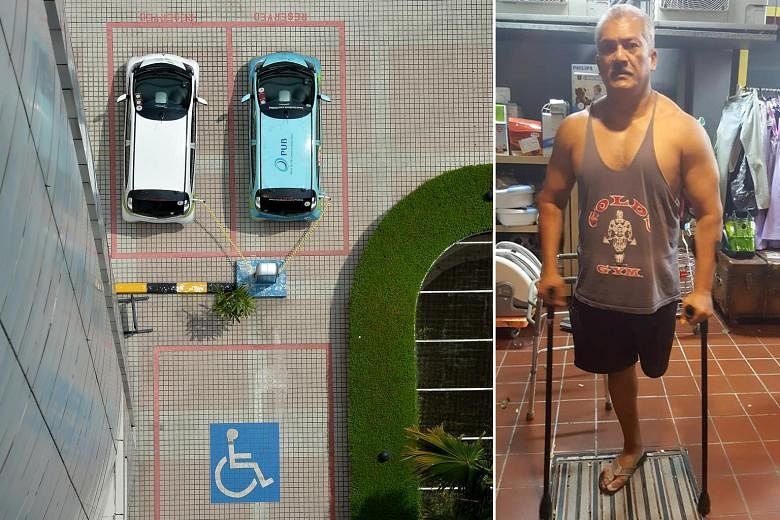Struck by a tumour at age 22, Mr Kalai Vanen lost his left leg. To get around, he uses elbow crutches.
He was thus dismayed by new tighter rules announced last Thursday over who can use carpark spaces for the handicapped.
Under the criteria, which take effect on Nov 1, only people with disabilities and who use wheelchairs, walking frames or lower-limb prostheses can park in the spaces. Previously, those using quadsticks and crutches were also included.
Last night, the Ministry of Social and Family Development (MSF) clarified that it would be flexible in deciding whether those with disabilities are entitled to park at accessible spaces - whatever aids they use.
"Those with medical conditions such as muscular dystrophy, poliomyelitis and cerebral palsy would be considered for eligibility for carpark labels based on their condition and needs, beyond just the type of mobility aids used," it said. It added: "MSF is also prepared to consider any deserving cases... even if they do not fully meet the default eligibility criteria."
-
38%
-
Percentage increase in number of new carpark label holders from 2012 to 2016.
-
CAR PARK LABEL SCHEME
-
The Car Park Label Scheme lets those with physical disabilities park at accessible parking spaces. These spaces are about 1 1/2 times the size of a normal one, so that people with bulky mobility aids can fully extend the car door. People can apply for the label if they are certified to have a permanent physical disability or medical condition that constrains mobility. They are:
• Cerebral palsy
• Loss/deformity of lower limbs
• Muscular dystrophy
• Paraplegia
• Poliomyelitis
• Spina bifida
• Tetraplegia
They must also be medically certified to require the use of the following mobility aids:
• Wheelchairs
• Walking frames
• Lower-limb prosthesis
Sue-Ann Tan
This came after worried reactions from the community over the new rules. In a Facebook post on Wednesday, Mr Kalai, 58, said he prefers using elbow crutches but that MSF's new move meant that he would have to use a walking frame to get the carpark label.
"Neither walking aid would allow me to walk and hold an umbrella if it rains nor would they be of any help if I had to carry a bag or two and have to manoeuvre walking around a parking lot," said the personal trainer. "As strong as I am, walking is not easy," he added.
MSF last night said that Mr Kalai would still get the carpark label because of his condition.
President of the Handicaps Welfare Association Wan Fook Wing told The Straits Times: "Many people got anxious and wondered if they would be denied a label. Some of my clients were upset and asked me what would happen because they really need the lots."
Explaining the tighter criteria, MSF noted a rising demand for accessible parking spaces - which will accelerate as the population ages. The number of new carpark label holders went up 38 per cent from 1,273 in 2012 to 1,758 last year.
It said it has been setting aside more parking spaces in areas of high demand as well as more accessible pick-up and drop-off points. But "given our physical constraints, there is a limit to how many more accessible lots we can have".
After consultations, it said, there was general agreement that the parking spaces should be reserved for those who need the extra space.
Disabled People's Association executive director Marissa Medjeral-Mills said: "We know there has been competition for lots, and people have given feedback that labels were given away too easily."
But, she said, there should have been "wider consultation". "We received calls from people who were surprised and didn't understand. "
On the ministry's latest clarification, Mr Kalai said: "It's good to know they have done this so the right people who need it can benefit from the labels."


